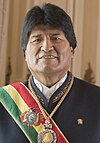David Choquehuanca
David Choquehuanca Céspedes | |
|---|---|
| File:1700FP1338 Choquehuanca.jpg | |
| Chancellor of Bolivia | |
| Assumed office January 2006 | |
| President | Evo Morales |
| Preceded by | Armando Loaiza |
| Personal details | |
| Born | 7 May 1961 Omasuyos Province, La Paz, Bolivia |
| Political party | Movement for Socialism – Political Instrument for the Sovereignty of the Peoples |
| Occupation | Peasant union leader, intellectual |
David Choquehuanca Céspedes (born May 7, 1961 in Omasuyos Province) is a Bolivian politician. He has served as the Foreign Minister of Bolivia since 23 January 2006.[1]
Career
Choquehuanca, who is an Aymara Indian, is an activist in the Aymara indigenous and campesino movement. He worked in support of the Unified Syndical Confederation of Rural Workers of Bolivia, through various political actions, trainings, and congresses.[2] From 1998 to 2005, he worked as National Coordinator of the Programa Nina (meaning fire in Aymara), an NGO consortium that provides training to rural movement leaders.[2] He has worked with international agencies and has been an advisor to President Evo Morales, a fellow Aymara, since before Morales's election to the Presidency.[citation needed]
He is considered one of the most important ministers of Morales.[3] Only he and Luis Arce Catacora, Minister of Economy and Finance, have served in their Bolivian cabinet posts since the beginning of Evo Morales' presidency in 2006.
Interaction with 2011 indigenous march
Choquehuanca visited the Eighth Grand National Indigenous March twice on behalf of the government. On September 14 and 15, he conveyed the message that "We cannot change what the president has already decided" at the beginning of a long but fruitless dialogue with leaders of CIDOB and the Subcentral TIPNIS. From September 15, the march was blockaded from advancing by a crowd of some 200 campesino and colonizers' union members at the San Lorenzo bridge of Yucumo. Between the two protests, police set up a their own blockade, preventing the march from advancing.[4]
On the morning of September 24, Choquehuanca returned to the indigenous march. Again negotiations with the march leadership were inconclusive. A group of female marchers grabbed Choquehuanca and led him marching down the highway in an effort to circumvent the police blockade.[5] At the police blockade, a tense standoff escalated into a brief confrontation, but the marchers succeeded in passing the police line.[6] Several government officials, including Minister of Interior Sacha Llorenti and Minister of Transparency Nardi Suxo, said that this was a "kidnapping" (secuestro), but Choquehuanca steadfastly refused to label it as such saying that "the sisters and [female] comrades grabbed me, surely they had thought that they would pass that police encirclement with the Chancellor; I was not insulted, nor mistreated, but yes, they obliged me to walk."[7] La Paz Prosecutor Patrica Santos, who was charged with investigating the events, received Choquehuanca's testimony to this effect on 21 November.[8] In February 2012, the Prosecutor's Office subpoenaed twenty-six leaders of the indigenous movement and its allies to testify in an investigation of the incident as an alleged homicide.[9] Former human rights ombudsman Waldo Albarracín has described the charges of kidnapping and attempted homicide as without merit.[10]
References
- ^ Chileans Rule Out Sea Access Talks with Bolivia Angus Reid Consultants
- ^ a b "Estaba presente en los bloqueos de caminos, huelgas de hambre, movilizaciones sociales, talleres de capacitación, ampliados y congresos de las organizaciones del movimiento popular."Ministerio de Relaciones Exteriores. "DAVID CHOQUEHUANCA CÉSPEDES". Retrieved 10 April 2012.
- ^ "A new political map in Bolivia" (in Spanish). Brecha. 2013-03-15.
- ^ Fundación Tierra (2012). Marcha indígena por el TIPNIS: La lucha en defensa de los territorios. La Paz, Bolivia: Fundación Tierra. p. 46.
- ^ "Bolivian protesters use official as shield – Americas". Al Jazeera English. 25 September 2011. Retrieved 29 September 2011.
- ^ Fundación Tierra (2012). Marcha indígena por el TIPNIS: La lucha en defensa de los territorios. La Paz, Bolivia: Fundación Tierra. pp. 109–110.
- ^ "Las hermanas y compañeras me agarraron, seguramente han pensado que pasarían con el canciller ese cerco policial, no he recibido insultos, no me maltratan pero si me obligan a caminar." "CIDOB advierte enfrentamiento si no expulsan a cocaleros del TIPNIS". La Jornada. 2011-11-18. Retrieved 2011-12-05.
- ^ "Choquehuanca ratifica que no fue secuestrado". El Deber. 2011-11-22. Retrieved 2011-12-05.
- ^ "TIPNIS: Indígenas califican como "cacería de brujas" a las citaciones por presunto secuestro al Canciller". Agencia de Noticias Fides. 2012-02-24. Retrieved 2012-03-08.
- ^ "Abogado descalifica figura de tentativa de homicidio". www.eldiario.net. Retrieved 2012-03-08.

